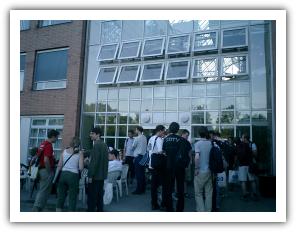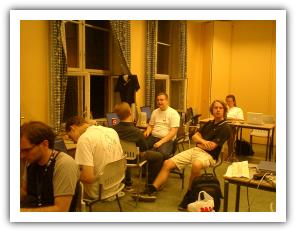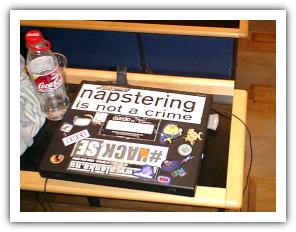
<stockholm> aj: will you come?
<stockholm> aj: 12. -17 jul
<stockholm> aj: please? (*bamby eyes*)
<aj> stockholm: hey, if someone wants to wave free plane tickets in my face i could be easily convinced :)
Europeans are so generous. Well, at least with money they collect from Americans. Continuing the exciting saga of the travelblog, July saw me setting off to Norway, land of the midnight sun and Viking invaders, or, more accurately, Oslo, land of the midnight semi-twilight and hideously expensive food. The excuse this time was DebConf 3, also comprising the inaugural DebCamp.
(Warning, this one’s got lotsa piccies)
My itinerary for this escapade was to fly Cathay Pacific from Brisbane to London (via Cairns and Hong Kong), spend a couple of days in London, fly British Airways to Oslo, hack, confer and hopefully tour for a bit over a week, then fly back the way I’d come with a four hour stopover in London, and a six hour stopover in Hong Kong. Sounds like fun, doesn’t it?
 The flight to Hong Kong was pretty unremarkable. Cathay was reasonably nice, as far as cattle-class goes, and the leg from Cairns had the virtue of being largely empty. Hong Kong airport suffered first from being obsessive about SARS — they use a nifty little lasery temperature checker on every passenger as you enter the departure area to see if you’re running a fever, and run regular announcements telling you to not to sneeze on people and suchlike; and it also suffered from also being hot and humid thanks to summer, and dusty and poorly air-conditioned, presumably thanks to the renovations that were going on. As highly suggestable as I am, and with no thanks to the plane’s ineffectual air-conditioning while we were on the tarmac, I naturally left Hong Kong with my nose leaking like a faucet.
The flight to Hong Kong was pretty unremarkable. Cathay was reasonably nice, as far as cattle-class goes, and the leg from Cairns had the virtue of being largely empty. Hong Kong airport suffered first from being obsessive about SARS — they use a nifty little lasery temperature checker on every passenger as you enter the departure area to see if you’re running a fever, and run regular announcements telling you to not to sneeze on people and suchlike; and it also suffered from also being hot and humid thanks to summer, and dusty and poorly air-conditioned, presumably thanks to the renovations that were going on. As highly suggestable as I am, and with no thanks to the plane’s ineffectual air-conditioning while we were on the tarmac, I naturally left Hong Kong with my nose leaking like a faucet.
 A little worrying were the copious Internet terminals around the place, all non-functional. When I eventually sat down and pulled my trusty laptop out, wireless didn’t work straight away, either. Finding some random employee and asking didn’t help any either. After wandering around, and realising that there really isn’t much thrilling stuff to do in an airport at 10pm, I had another go, and after fixing a broken, DHCP-assigned netmask, and providing credit card details got some net access. Yay! I downloaded my email. Yay! Oh, look, here’s one that begins “Anthony, I need to restore back to Tuesday’s back up – don’t know how!!!” and ends “I knew something bad would happen if you left the country… HELP!!!”. Yay. At this point it’s about midnight in Brisbane on the day I’d left. On the upside, I still had enough access to the appropriate computers, and there was enough information in the email, that I could fix the problem fairly easily. At midnight Brisbane time on a server in a dark and locked office, from an airport in Asia, via a server in the US with encrypted tunnels all the way. Pretty nifty, really.
A little worrying were the copious Internet terminals around the place, all non-functional. When I eventually sat down and pulled my trusty laptop out, wireless didn’t work straight away, either. Finding some random employee and asking didn’t help any either. After wandering around, and realising that there really isn’t much thrilling stuff to do in an airport at 10pm, I had another go, and after fixing a broken, DHCP-assigned netmask, and providing credit card details got some net access. Yay! I downloaded my email. Yay! Oh, look, here’s one that begins “Anthony, I need to restore back to Tuesday’s back up – don’t know how!!!” and ends “I knew something bad would happen if you left the country… HELP!!!”. Yay. At this point it’s about midnight in Brisbane on the day I’d left. On the upside, I still had enough access to the appropriate computers, and there was enough information in the email, that I could fix the problem fairly easily. At midnight Brisbane time on a server in a dark and locked office, from an airport in Asia, via a server in the US with encrypted tunnels all the way. Pretty nifty, really.
 In spite of my sniffling, I managed to get a fairly decent sleep on the flight to London, and while “refreshed” is probably far too strong a term, I was at least rested and awake when we landed at Heathrow at ridiculous o’clock in the morning. With some advice, and a helpful map, I managed to navigate the Tube and find my hotel, which let me freshen up and change (thank heaven), before wandering around London. The room was pretty pokey, but nice enough — it had a bed, a bathroom and a balcony, it was just down the road from Paddington Station, and an hour or so’s walk to the city center, and it was 25 quid a night.
In spite of my sniffling, I managed to get a fairly decent sleep on the flight to London, and while “refreshed” is probably far too strong a term, I was at least rested and awake when we landed at Heathrow at ridiculous o’clock in the morning. With some advice, and a helpful map, I managed to navigate the Tube and find my hotel, which let me freshen up and change (thank heaven), before wandering around London. The room was pretty pokey, but nice enough — it had a bed, a bathroom and a balcony, it was just down the road from Paddington Station, and an hour or so’s walk to the city center, and it was 25 quid a night.
Actually refreshed this time, I found a place that served breakfast, ate, and wandered back out to the street, at which point I was treated to the admonishing site of a guy lying unmoving on the road, in front of a stopped bus, with a small crowd gathered around looking concerned, and a police officer directing traffic. Mental note to self: cross at the pedestrian crossings only. I planned to basically head south to Victoria Park, then generally east towards the city, and whatever interesting sights I might see. I like walking around cities, for some reason.















Day one ended with a whimper — I managed to walk too far north trying to find Kings Cross, and got lost in some of the inner suburbs, with not a Tube stop in sight. High density housing everywhere, and the streets just kept turning into dead ends, completely ruining my nonchalant “Oh, why yes, I think I’ll take this turn now” attitude. Things like this happen, when you’re too cool to work out where you want to go in advance. On the upside, I discovered that the Tube stops tend to have useful maps of the immediate area, and occassionally incredibly helpful maps nominally to document bike routes, just sitting there ready to be taken for free. So I’m a cheapskate, bite me. At any rate, Arsenal Stadium, (or perhaps more particularly, Arsenal Station) was a definite site for sore feet by the end of that day.
Day two was more of the same, with slightly more planning up front, enabled by possession of a useful map. Touristy, touristy, touristy!















 As a right-wing death beast in training (we’re provided with bibs to catch the foam and slobber until we learn more control), I was amused to spend my time watching for left-wing propaganda. This was, after all, Europe I was visiting. It was all there, and easy to find. I wandered through various bookstores trying to find a copy of Sowell’s Basic Economics, and while I failed miserably at that (the closest I came was Borders, which had had a copy previously but was currently out of stock), I did manage to get a nice view of what passes for balanced, informative resource material on political and cultural studies.
As a right-wing death beast in training (we’re provided with bibs to catch the foam and slobber until we learn more control), I was amused to spend my time watching for left-wing propaganda. This was, after all, Europe I was visiting. It was all there, and easy to find. I wandered through various bookstores trying to find a copy of Sowell’s Basic Economics, and while I failed miserably at that (the closest I came was Borders, which had had a copy previously but was currently out of stock), I did manage to get a nice view of what passes for balanced, informative resource material on political and cultural studies. 
The anti-American bias amongst people, rather than literature, was at best subtextual — I spent my first day in London wandering around wearing my “Orlando Florida” shirt, and was accosted on the streets exactly once, by someone who appeared to be an evangelical mormon. With both “m”s, although after being accosted by dozens of people trying to hand out pamphlets for various goods and services, my tolerance was getting pretty low. Nevertheless, I’m fairly uncomfortable with a community that sees fit to fill shelves with fairly rabid propaganda uniformly against the war in Iraq, within mere months of the end of major hostilities. That’s not enough time for the facts about the situation in Iraq to become clear, even ignoring that governments and other organisations are still either unwilling to release, or actively concealing information about the lead up to the war, and the war itself. And even given full knowledge of the facts, a month or two simply isn’t enough time to form well-reasoned conclusions about it, or to write coherent articles about those conclusions, or to provide quality editorial input. All you’re getting is something that could as easily have been written a year ago, with extra heat and passion, neither of which are particularly useful additions to books whose purpose is to inform. Meh.

 Naturally there were also protests. I’ve no idea why — given what’s already happened, there’s nothing in Iraq that actually makes sense to change in a significant manner. But hey, it’s not healthy to hold your rage in, right? And who doesn’t love to be walking down the street and look down to see a sign telling you that you’re dead? Naturally, political propaganda is a perfectly fine excuse to litter: after all, the ends always justify the means.
Naturally there were also protests. I’ve no idea why — given what’s already happened, there’s nothing in Iraq that actually makes sense to change in a significant manner. But hey, it’s not healthy to hold your rage in, right? And who doesn’t love to be walking down the street and look down to see a sign telling you that you’re dead? Naturally, political propaganda is a perfectly fine excuse to litter: after all, the ends always justify the means.
Equally naturally, the University precint was covered in tacky posters for communist events. Student socialism seems to be the standing wave of fashion: whereas most fads sweep through the population and fade away, student socialism seems to just sustain itself unendingly, as its medium comes and goes underneath it.


You know, it’s really hard writing enough stuff to get these pictures laid out nicely on the page. Photoblogging sucks.
 Anyway. After two days wandering around London, I left for Oslo. Well, I tried to, but ended up getting completely screwed around by British Airways; evidently I was meant to be there two hours in advance, not the hour and a half listed on my flight coupon, and apparently it’s sensible to plan an extra half hour or so just to deal with the horribly disorganised check in. On the upside, having missed my scheduled flight, I was wait-listed for the next flight, on which the only spare seat ended up being in business class.
Anyway. After two days wandering around London, I left for Oslo. Well, I tried to, but ended up getting completely screwed around by British Airways; evidently I was meant to be there two hours in advance, not the hour and a half listed on my flight coupon, and apparently it’s sensible to plan an extra half hour or so just to deal with the horribly disorganised check in. On the upside, having missed my scheduled flight, I was wait-listed for the next flight, on which the only spare seat ended up being in business class.
There’s less exciting travelbloggy stuff from Oslo, since there was an actual point to me being there. People were met, things were learnt, bugs were fixed, coding was done, stuff was, as it often is, discussed. The accommodations consisted of the floor of the local high school gym, the food was the civilian equivalent of MREs, or large portions of in-flight meals, drinks were jugs of tap water from the toilets. But hey, when the choice is spending a month’s wages on a hamburger and a coke, who’s complaining? Conferencing on the cheap is a pretty nice thing to be able to do, and this one was pretty much that: no registration fees, sponsorship in the low tens of thousands; and on the other hand, a full week’s worth of events, international speakers and attendees, and about a hundred people showing up. Oh, and pretty much everyone leaving happy with what they got out of it. Sweet.















(One thing you might have noticed is that I’ve found a cute little Gimp thingy to make my photos look a little bit prettier on the page. It’s called Photo-Stack, if you find yourself caring. I think it looks quite trendy, and it doesn’t matter even slightly what you think. Thankyou, come again.)
UPDATE 2003/08/21:
Interesting debcamp links: the debconf3 and debcamp homepage and the debcamp group photo — put your pointer over the face to see the name. Nifty.

 The flight to Hong Kong was pretty unremarkable. Cathay was reasonably nice, as far as cattle-class goes, and the leg from Cairns had the virtue of being largely empty. Hong Kong airport suffered first from being obsessive about SARS — they use a nifty little lasery temperature checker on every passenger as you enter the departure area to see if you’re running a fever, and run regular announcements telling you to not to sneeze on people and suchlike; and it also suffered from also being hot and humid thanks to summer, and dusty and poorly air-conditioned, presumably thanks to the renovations that were going on. As highly suggestable as I am, and with no thanks to the plane’s ineffectual air-conditioning while we were on the tarmac, I naturally left Hong Kong with my nose leaking like a faucet.
The flight to Hong Kong was pretty unremarkable. Cathay was reasonably nice, as far as cattle-class goes, and the leg from Cairns had the virtue of being largely empty. Hong Kong airport suffered first from being obsessive about SARS — they use a nifty little lasery temperature checker on every passenger as you enter the departure area to see if you’re running a fever, and run regular announcements telling you to not to sneeze on people and suchlike; and it also suffered from also being hot and humid thanks to summer, and dusty and poorly air-conditioned, presumably thanks to the renovations that were going on. As highly suggestable as I am, and with no thanks to the plane’s ineffectual air-conditioning while we were on the tarmac, I naturally left Hong Kong with my nose leaking like a faucet. A little worrying were the copious Internet terminals around the place, all non-functional. When I eventually sat down and pulled my trusty laptop out, wireless didn’t work straight away, either. Finding some random employee and asking didn’t help any either. After wandering around, and realising that there really isn’t much thrilling stuff to do in an airport at 10pm, I had another go, and after fixing a broken, DHCP-assigned netmask, and providing credit card details got some net access. Yay! I downloaded my email. Yay! Oh, look, here’s one that begins “Anthony, I need to restore back to Tuesday’s back up – don’t know how!!!” and ends “I knew something bad would happen if you left the country… HELP!!!”. Yay. At this point it’s about midnight in Brisbane on the day I’d left. On the upside, I still had enough access to the appropriate computers, and there was enough information in the email, that I could fix the problem fairly easily. At midnight Brisbane time on a server in a dark and locked office, from an airport in Asia, via a server in the US with encrypted tunnels all the way. Pretty nifty, really.
A little worrying were the copious Internet terminals around the place, all non-functional. When I eventually sat down and pulled my trusty laptop out, wireless didn’t work straight away, either. Finding some random employee and asking didn’t help any either. After wandering around, and realising that there really isn’t much thrilling stuff to do in an airport at 10pm, I had another go, and after fixing a broken, DHCP-assigned netmask, and providing credit card details got some net access. Yay! I downloaded my email. Yay! Oh, look, here’s one that begins “Anthony, I need to restore back to Tuesday’s back up – don’t know how!!!” and ends “I knew something bad would happen if you left the country… HELP!!!”. Yay. At this point it’s about midnight in Brisbane on the day I’d left. On the upside, I still had enough access to the appropriate computers, and there was enough information in the email, that I could fix the problem fairly easily. At midnight Brisbane time on a server in a dark and locked office, from an airport in Asia, via a server in the US with encrypted tunnels all the way. Pretty nifty, really. In spite of my sniffling, I managed to get a fairly decent sleep on the flight to London, and while “refreshed” is probably far too strong a term, I was at least rested and awake when we landed at Heathrow at ridiculous o’clock in the morning. With some advice, and a helpful map, I managed to navigate the Tube and find my hotel, which let me freshen up and change (thank heaven), before wandering around London. The room was pretty pokey, but nice enough — it had a bed, a bathroom and a balcony, it was just down the road from Paddington Station, and an hour or so’s walk to the city center, and it was 25 quid a night.
In spite of my sniffling, I managed to get a fairly decent sleep on the flight to London, and while “refreshed” is probably far too strong a term, I was at least rested and awake when we landed at Heathrow at ridiculous o’clock in the morning. With some advice, and a helpful map, I managed to navigate the Tube and find my hotel, which let me freshen up and change (thank heaven), before wandering around London. The room was pretty pokey, but nice enough — it had a bed, a bathroom and a balcony, it was just down the road from Paddington Station, and an hour or so’s walk to the city center, and it was 25 quid a night.





























 As a right-wing death beast in training (we’re provided with bibs to catch the foam and slobber until we learn more control), I was amused to spend my time watching for left-wing propaganda. This was, after all, Europe I was visiting. It was all there, and easy to find. I wandered through various bookstores trying to find a copy of Sowell’s Basic Economics, and while I failed miserably at that (the closest I came was Borders, which had had a copy previously but was currently out of stock), I did manage to get a nice view of what passes for balanced, informative resource material on political and cultural studies.
As a right-wing death beast in training (we’re provided with bibs to catch the foam and slobber until we learn more control), I was amused to spend my time watching for left-wing propaganda. This was, after all, Europe I was visiting. It was all there, and easy to find. I wandered through various bookstores trying to find a copy of Sowell’s Basic Economics, and while I failed miserably at that (the closest I came was Borders, which had had a copy previously but was currently out of stock), I did manage to get a nice view of what passes for balanced, informative resource material on political and cultural studies. 

 Naturally there were also protests. I’ve no idea why — given what’s already happened, there’s nothing in Iraq that actually makes sense to change in a significant manner. But hey, it’s not healthy to hold your rage in, right? And who doesn’t love to be walking down the street and look down to see a sign telling you that you’re dead? Naturally, political propaganda is a perfectly fine excuse to litter: after all, the ends always justify the means.
Naturally there were also protests. I’ve no idea why — given what’s already happened, there’s nothing in Iraq that actually makes sense to change in a significant manner. But hey, it’s not healthy to hold your rage in, right? And who doesn’t love to be walking down the street and look down to see a sign telling you that you’re dead? Naturally, political propaganda is a perfectly fine excuse to litter: after all, the ends always justify the means.

 Anyway. After two days wandering around London, I left for Oslo. Well, I tried to, but ended up getting completely screwed around by British Airways; evidently I was meant to be there two hours in advance, not the hour and a half listed on my flight coupon, and apparently it’s sensible to plan an extra half hour or so just to deal with the horribly disorganised check in. On the upside, having missed my scheduled flight, I was wait-listed for the next flight, on which the only spare seat ended up being in business class.
Anyway. After two days wandering around London, I left for Oslo. Well, I tried to, but ended up getting completely screwed around by British Airways; evidently I was meant to be there two hours in advance, not the hour and a half listed on my flight coupon, and apparently it’s sensible to plan an extra half hour or so just to deal with the horribly disorganised check in. On the upside, having missed my scheduled flight, I was wait-listed for the next flight, on which the only spare seat ended up being in business class.













